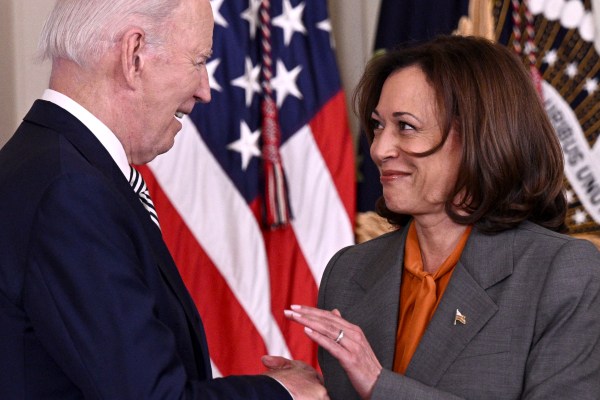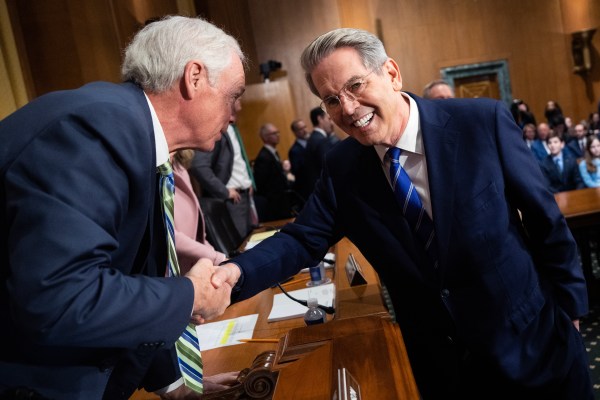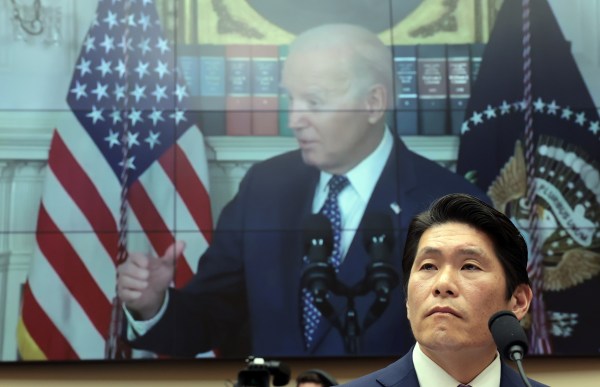Happy Tuesday! Attention prospective homebuyers: The Chicago childhood home of Robert Prevost, who now goes by Pope Leo XIV, will be sold at auction in June. We can’t promise you’ll get a good price-per-square-foot for the new pontiff’s former digs, but the dinner party lore would be heavenly.
Quick Hits: Today’s Top Stories
- President Donald Trump held a two-hour phone call with Russian President Vladimir Putin on Monday, after which Trump said on social media that Russia and Ukraine would “immediately start negotiations toward a Ceasefire.” Putin confirmed after the phone call that the Kremlin “will propose and is ready to work with” Ukraine to reach a “possible future peace accord.” After also conferring with Ukrainian President Volodymyr Zelensky, Trump said that both sides would negotiate conditions for such a deal. The Vatican offered to host the talks, the president added. It remains unclear when the negotiations would take place, after Putin opted to skip a scheduled face-to-face meeting with Zelensky in Istanbul last week.
- Israel announced Monday that five United Nations trucks carrying humanitarian aid had entered the Gaza Strip from Israel’s Kerem Shalom border crossing, bringing Palestinian civilians flour, baby food, medical supplies, and fuel supplies. Israel “will continue to facilitate humanitarian assistance in the Gaza Strip,” Israeli officials said in a statement, “while making every effort to ensure that the aid does not reach Hamas.” Israel had blocked the Gaza Strip from receiving aid deliveries since early March, citing the vast amounts of supplies seized by Hamas. Israeli Prime Minister Benjamin Netanyahu said the trucks will provide a “minimal, basic bridge” to bring critical resources into Gaza temporarily until Israeli-constructed aid distribution centers are completed.
- The European Union and United Kingdom agreed to a new trade deal on Monday that establishes a defensive security pact and eliminates trade restrictions erected in the aftermath of Brexit, though the full terms have yet to be disclosed. Reported details of the deal include expedited border checks on certain imports, including food; reduced tariffs on imports of British steel; providing European fishing boats access to British waters through 2038; and allowing British travelers access to electronic gates when crossing European borders. Additionally, the EU and U.K. will coordinate on issuing economic sanctions and collaborate in military development projects.
- The U.K. and Iran summoned each other’s diplomatic envoys on Monday, two days after three Iranian nationals—charged with spying in the U.K. on behalf of Tehran—appeared before a London court. British prosecutors allege that the trio conducted surveillance on journalists associated with Iran International, a U.K.-based Persian news outlet often critical of the Islamic Republic. U.K. Home Secretary Yvette Cooper said on Monday that the government will draft new laws to “restrict the activity and operations of foreign state-backed” groups in the U.K., including Iran’s Islamic Revolutionary Guard Corps.
- The Supreme Court on Monday paused a federal district judge’s order that had barred the Trump administration from immediately canceling the temporary protected status (TPS) designation for more than 300,000 Venezuelans that allowed them to legally reside in the United States. In February, Homeland Security Secretary Kristi Noem ordered that TPS status be revoked for Venezuelan nationals—a move U.S. District Judge Edward Chen blocked, citing its “unprecedented” nature. The Trump administration appealed the decision, but a federal appeals court left Chen’s ruling in place until it ruled on the appeal. The Supreme Court, in a one-page unsigned order, reversed that decision on Monday, allowing the Trump administration to move forward with removing TPS status from Venezuelan nationals until the federal appeals court rules on the administration’s appeal.
- The House Budget Committee late on Sunday night advanced the GOP’s reconciliation bill in a 17-16 vote after four House Republicans—who voted against advancing the bill on Friday—switched their votes to “present.” Speaker Mike Johnson will work this week to win over the support of GOP holdouts as he seeks to pass the bill before the chamber’s Memorial Day recess. Republican opponents of the bill have cited reasons from front-loaded spending provisions to delayed work requirements for Medicaid recipients. Other sticking points include the potential elimination of tax credits created in the Inflation Reduction Act of 2022 and the state and local tax (SALT) deduction cap.
- President Trump on Monday signed into law a bipartisan bill, the “Take it Down Act,” which makes it a federal crime to disseminate sexually explicit imagery, including AI deepfakes, without the subject’s consent. The statute requires that social media companies take down such explicit content within 48 hours of receiving a removal request from a victim, and instills criminal penalties on both companies that fail to abide by the law and individuals who share the content without consent. The bill—publicly championed by first lady Melania Trump—passed the Senate in February unanimously unanimously and was approved in a 409-2 House vote in late April. The Federal Trade Commission is tasked with enforcing the law.
The West Wins in Romania
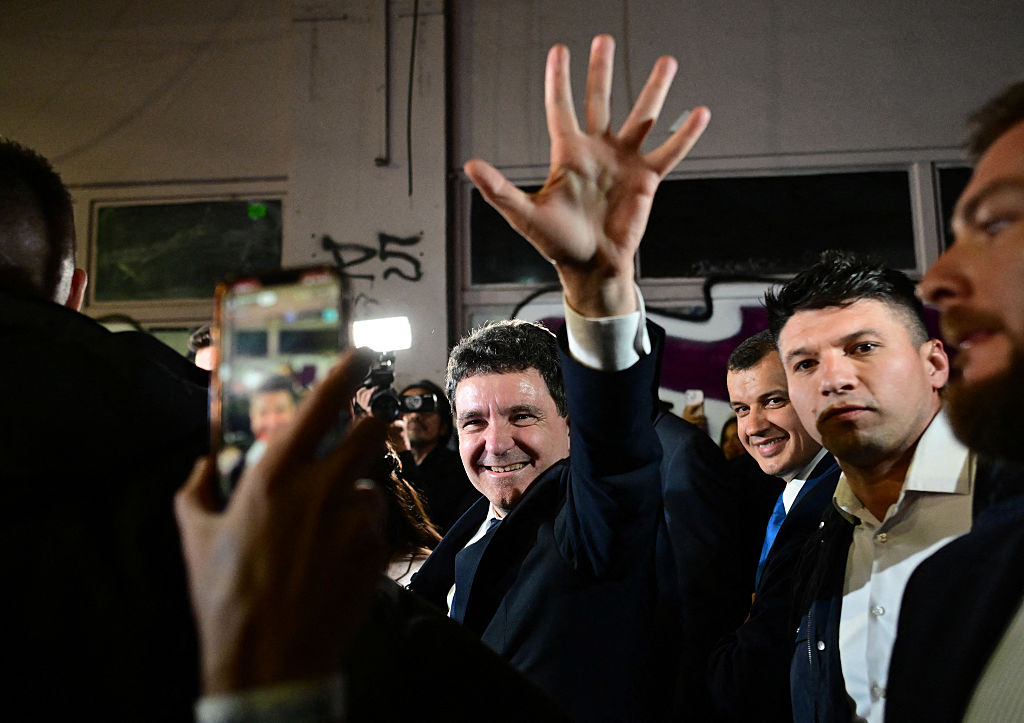
Following the shocking annulment of Romania’s presidential election last year amid allegations of Russian interference, the eastern European nation and NATO ally undertook a do-over on Sunday. The result was another upset, but this time, it will count.
As Romanians went to the polls this weekend, they faced the same ideological choice as before: a nationalist, conservative demagogue who’s a fierce critic of the European Union or a pro-West reformer who supports Ukraine. This time, instead of disqualified far-right candidate Cǎlin Georgescu being on the ballot, they were choosing between Georgescu ally George Simion, a nationalist member of parliament, and Nicușor Dan, the independent mayor of Bucharest.
Simion led by double digits after the first round of voting on May 4, but as the results came in for Sunday night’s runoff, Dan was the clear winner, finishing with 54 percent of the vote. Europeans opposed to the rise of the populist right in their countries breathed a sigh of relief. But the election was also yet another example of how, across the developed world, political outsiders continue to perform better than establishment candidates.
Although Dan and Simion ran on starkly different platforms, they shared one important similarity: Both were relative political outsiders, allowing them to distance themselves from the corrupt establishment that has long dominated Romanian politics. “The people are mad at the establishment and the establishment parties,” Iulia Joja, a senior fellow at the Middle East Institute and former Romanian presidential adviser, told TMD. “Part of the reason why people are voting for the far right is not necessarily because they’re far right, but because they are the most credible opposition party.”
But Dan was ultimately able to present his own convincing alternative to the establishment.“It’s your victory!” Dan told supporters in Romania’s capital of Bucharest on Sunday night as they chanted his name and waved EU flags. For many Romanians, the mayor represented a refreshing change from the status quo. He wasn’t associated with either of the two main parties, the Social Democrats and the National Liberals.
Instead, the former mathematician—a two-time gold medalist at the International Math Olympiad, no less—rose to political fame after founding an architectural preservation group, campaigning against corruption in Bucharest, and becoming the city’s first independent mayor in 2020. He announced his intention to campaign for the presidency as an independent in December, following the annulment of the previous presidential election, and dislodged the Save Romania Union candidate, Elena Lasconi, as the torch bearer for pro-EU Romanians.
Dan’s campaign also drew on many of the same themes as previous opponents of the nationalist right. “Our task is to convince Romanians that Romania needs to take a pro-Western direction,” he said earlier this month, after finishing with 21 percent of the vote to Simion’s 40.6 percent in the first round of the presidential election. But Dan managed to present pro-Western policies as part of a reforming, rather than an establishment, message.
He campaigned under the slogan “Honest Romania,” arguing that the previous “political era and way of doing politics” was over. Dan’s personality and lifestyle helped reinforce his image as a fresh face in a tired political system: He lives with his partner and two children in a small rented apartment in a modest Bucharest neighborhood and lacks much of the polish and charisma of more professional politicians. He had also gained credibility as a defender of the average Romanian through his long track record of opposing high-rise housing projects, linked to corruption and wealthy developers, in middle-class Bucharest neighborhoods.
Dan’s campaign married that biography to a clear argument that a vote for Simion would be a vote against Europe, the West, and economic development. The country was faced with two “opposed options,” he declared. “A pro-Western direction versus an anti-Western direction; a path of economic freedom and prosperity versus economic isolationism; and a vote between a culture of wisdom and dialogue versus a culture of hatred promoted by the isolationist candidate.”
The 38-year-old Simion also ran against the Romanian political establishment, but with a markedly different tone than the mild-mannered Dan. The fourth-place finisher in the 2024 presidential election, Simion led protests against the annulment of that election’s results. But when it became apparent that Georgescu would not be running again, Simion became the chosen candidate of the Alliance for the Union of Romanians with Georgescu’s blessing.
Simion campaigned as a firebrand, focused on a perennial issue in central European politics: endless wrangling over the political rights of diaspora populations. Roughly 5 million Romanians live abroad, and substantial populations of ethnic Romanians reside in Ukraine, Hungary, and Moldova, many of whom hold Romanian citizenship and voting rights. Simion advocated for the unification of Romania and Moldova and argued that Romanian speakers in Ukraine are systematically oppressed. He has been banned from entering both Moldova and Ukraine.
He also sought to position himself as part of an international populist coalition. “Together, we will oppose illegal immigration and anti-American sentiments in Europe!” he said onstage in Poland, campaigning with the presidential candidate for that country’s populist party, Law and Justice. Known for sporting a MAGA hat, Simion has told reporters that he’s aligned with Donald Trump because they both oppose “politically correct people who undermine our freedom and opinions.” In Simion’s case, those “politically correct people” include prominent European politicians like French President Emmanuel Macron, whose government he compared to Iran’s.
Simion once accused elites in Romania of conspiring with the “new Soviet Union, with its commissars from Brussels” to impose a “new order” of political correctness and neo-Marxism on Romanians. “With God’s help, we will stop everyone from [Jean-Claude] Juncker to Ursula von der Leyen to Dr. [Anthony] Fauci and all those who are trying to impose the new global order,” he declared in February 2024.
During the recent campaign, however, he sought to strike a more moderate tone. “We are a Eurorealist group, not Eurosceptic,” he said to Politico last week. He cast himself in the mold of more mainstream European conservatives, telling reporters that his party was in the “same political family” as Italian Prime Minister Giorgia Meloni, a nationalist conservative who has been pro-NATO and anti-Russia. Simion also advocated for the continued U.S. leadership of NATO earlier this month.
But many Romanian voters saw these statements as mixed messaging rather than a true change of heart. Simion consistently opposed military aid to Ukraine throughout the campaign, implicitly backing a less confrontational policy toward Russia. Romanians know “perfectly well” that Ukraine’s defeat would leave a dangerous nation directly on their doorstep, Daniel Fried, the former assistant secretary of state for European and Eurasian affairs and a distinguished fellow at the Atlantic Council, told TMD. Simion also received public support from Alexander Dugin, the Russian-nationalist intellectual with a strong ideological influence on Russian President Vladimir Putin.
Romanians, with recent memories of Soviet domination, are generally wary of any perceived Russian influence. Yet Simion was able to capitalize on public anger over Georgescu’s disqualification. More than 60 percent of Romanians disagreed with the Constitutional Court’s decision to annul the 2024 election, which sparked protests and condemnation from across the Romanian political spectrum (as well as from U.S. Vice President J.D. Vance and Elon Musk).
Simion called the decision a betrayal of democracy, saying that the judges responsible should be “publicly skinned alive” and promising to appoint Georgescu as his prime minister if he won. Despite such rhetoric, Simion consolidated the votes of nationalists, cultural conservatives, and many Romanians who were fed up with the country’s persistent corruption and recent economic stagnation. He exited the first round leading Dan by more than 20 percentage points.
But in the contest between Dan’s cerebral-verging-on-awkward style and Simion’s rhetorical bomb-throwing, the former mayor won out. Dan was widely considered to have won a televised debate on May 9, and Simion’s globetrotting campaigning among the diaspora in countries like Austria, Germany, and Poland in the days before the election didn’t pay off: Dan won strong majorities in urban areas, in the large Moldovan diaspora, and among ethnic Hungarians afraid of nationalist leadership, with turnout reaching its highest level in over a decade.
Many Romanians, especially the educated middle class, were deeply alarmed by the prospect of Simion and his party gaining power. “The perception is that among many, of fear that there is a risk of Romania turning hard [right] and having a regime change,” Joja said, pointing to Georgescu’s comments last year promising to abolish political parties and quoting prominent Romanian fascists. On Sunday, it briefly appeared that Simion would attempt to contest the results of the elections, as he wrote “I won!!!” on Facebook after voting ended Sunday. But by Monday morning, he had conceded.
Dan cast his win as a victory for Romanians seeking to reform a failing political system. But there was also a clear international dimension. As the mayor’s victory became clear, crowds in Bucharest began chanting: “Russia, Russia, don’t forget: Romania is not yours!” For its part, the Russian government was clearly displeased with the result. “The elections were strange, to say the least,” said Kremlin spokesman Dmitry Peskov. “We know the story of the candidate who had the best chance and who was simply removed from the race.”
European leaders, meanwhile, welcomed the news. “They have chosen the promise of an open, prosperous Romania in a strong Europe,” European Commission President Ursula von der Leyen said on social media. For Europe, Dan’s victory ensures Romania’s continued cooperation in getting aid to Ukraine and checks the expansion of Russian influence along Europe’s border. “It shows Romania is not as vulnerable, that their politics are not as susceptible to Russian manipulation,” Fried said.
But the country still faces deep problems: a large budget deficit, persistent brain drain, and high levels of corruption. Dan also faces an uphill battle in forming a governing coalition, as he does not lead his own party. Following his victory, he said he would move to form a government made up of the four “democratic parties” in the Parliament: the Social Democrats; the National Liberals, his former party; the Union to Save Romania; and the Hungarian minority Democratic Alliance of Hungarians in Romania.
At his victory speech, Dan seemed to understand that merely winning would not be enough: he would have to deliver results, quickly. “Let us continue to believe in Romania,” he said. “And get to work tomorrow!”
Today’s Must-Read
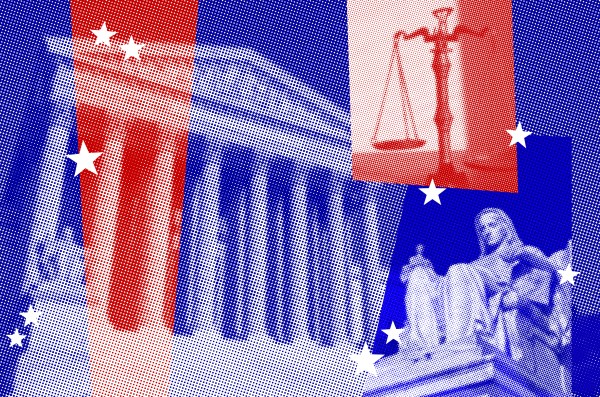
Nationwide Injunctions vs. Nationwide Executive Orders
Since Michigan v. EPA, the fight over how courts should act at the beginning of major lawsuits has become a central feature of anti-administration litigation. When plaintiffs file lawsuits against executive orders or agency regulations, they increasingly ask the trial judge to issue a “temporary restraining order” or “preliminary injunction” blocking the administration’s action. Then the parties quickly appeal up the judicial chain to higher courts, eventually the Supreme Court. In the federal trial courts, these orders are known as “nationwide injunctions” or “universal injunctions,” because they block an administration from imposing its policy against not only the challenger in that given case, but against people everywhere. … These universal injunctions have become a central feature of constitutional and regulatory litigation.
Toeing the Company Line
Worth Your Time
- In the New York Times, Richard Sandomir reflected on the life of Walter Frankenstein, a Jewish survivor of Nazi Germany who died at the age of 100 last month. “For more than two years, Walter Frankenstein and his small family were among the estimated 6,500 human U-boats in Berlin—Jews trying to elude Nazis by figuratively hiding like submarines. They took refuge in bombed-out buildings, cars, forests, craters, brothels or wherever they could survive for another day or week,” he wrote. “In the days before the war ended, the four Frankensteins lived in a subway station that had been converted into a bunker. ‘I lay on a plank bed with a straw mattress on it, put the children on it, and there we stayed until liberation,’ Mr. Frankenstein told the historian Barbara Schieb for an essay included in the 2009 book ‘Jews in Nazi Berlin: From Kristallnacht to Liberation,’ edited by Beate Meyer, Hermann Simon and Chana Schütz. ‘We had no water, no food, nothing.’”
- President Donald Trump is optimistic that he can broker a peace deal in Ukraine, but are Ukrainians? Not quite, Anne Applebaum reported for The Atlantic. “On Saturday, I asked Andriy Sadovyi, the mayor of Lviv, in western Ukraine, whether he expected the Russian-Ukrainian talks in Istanbul to lead to a cease-fire. ‘No,’ he told me. Later, I asked the audience at the Lviv Media Forum whether any of them expected a cease-fire soon. About 200 journalists and editors were in the room. No one raised their hand. Many laughed. Over several days in Lviv I didn’t meet anybody who believed that the Russian president wants to end the war, or that he will negotiate to do so in Istanbul,” she wrote. “Ukrainian reasoning is straightforward: Vladimir Putin has never said he wants to end the war. The propagandists on Russian state television have never said they want to end the war. The Russian negotiating team in Istanbul did not say it wanted to end the war.”
Washington Post: U.S. To Pay Nearly $5 Million to Family of Jan. 6 Rioter Ashli Babbitt
President Donald Trump’s administration is set to pay nearly $5 million to the family of Ashli Babbitt to settle a lawsuit brought by the estate of the Trump supporter who was fatally shot by police when she tried to storm the House Speaker’s Lobby during the Jan. 6, 2021, attack on the Capitol, according to two people familiar with the matter.
…
No final deal had been signed and terms had not been disclosed at the May 2 hearing.
New York Times: Russia Beefs Up Bases Near Finland’s Border
In the Zeitgeist
Longtime Hollywood makeup and prosthetics artist Greg Cannom died this month at age 73. You might not recognize his face, but you’ve likely seen the faces he’s created on the big screen. He won Academy Awards for best makeup in Mrs. Doubtfire, The Curious Case of Benjamin Button, Bram Stoker’s Dracula, and Vice.
Let Us Know
Do you think recent elections results in Poland and Romania will reinforce European resolve against Russia?


